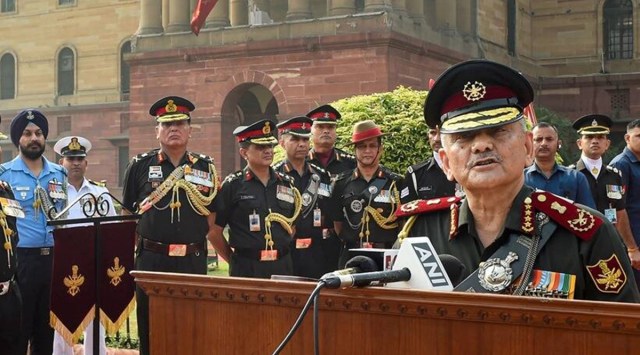Stating that an intense race towards militarisation of space has expanded the battle-space, Chief of Defence Staff (CDS) General Anil Chauhan on Tuesday said developing dual-use platforms with a special focus towards incorporating cutting-edge technology is needed in the space domain and India needs to transit from “support” to “enhancement” in this sector.
Highlighting that the increasing weaponisation of space has led to a possibility of a war in space, he said space is enhancing combat capabilities of other domains of land, sea, air and cyber. “The military application of space is the dominant discourse from which we cannot remain divorced,” he said.

Gen Chauhan was speaking at the inaugural session of a three-day Indian DefSpace Symposium organised by Indian Space Association (IspA).
The symposium comes amid a growing government and military focus on the space domain. In October last year, Prime Minister Narendra Modi had launched Mission DefSpace, under which 75 challenges in the space sector have been identified on which the private firms would work on.
On anti-satellite tests carried out by Russia and China, the CDS highlighted the need for India to build offensive and defensive capabilities in the space domain. He said India should expand the Navic constellation, provide agile space-based intelligence, surveillance and reconnaissance (ISR) and ensure secure satellite-assisted communications.
“We also need to explore the field of miniaturization of satellites and reusable launch platforms to mitigate cost challenges and accelerate the pace of augmenting our space-based capabilities,” Gen Chauhan said.
“Populating the space domain and the emergence of a dynamic threat environment to space assets also demanded that India enhance its space situational awareness capability,” he said, adding that ISRO’s Project Netra is a step in that direction.
Story continues below this ad
CDS Chauhan highlighted the need to factor the presence of trans-domain weapons, targeting from air or from inner to outer space, and integrate future space-based surveillance networks, highlighting the need to safeguard the Indian military’s assets with counter space capabilities. “We, as a nation, must realise the importance of building partnerships and sharing of potential in the space domain with friendly foreign countries,” he said.
Gen Chauhan said invasion of the space domain by commercial enterprises, as seen during the Russia-Ukraine conflict by SpaceX and Maxar, has unfolded a new area in the war on convergence. “This combined with the intense race towards militarisation of space has resulted in the battle-space becoming expanded and the very nature of warfare is at a major cusp of transformation,” the CDS said.
Air Vice Marshal D V Khot, D-G of Defence Space Agency, said there has been an enormous leap in India’s space ecosystem in recent times. He said each element of the ecosystem needs to perform and the threshold of the performance should be decided upon.
He said most technologies in space are dual-use technologies, but for them to be used for defence, they need to be adapted in certain ways. He said it needs to be deliberated on what would be those adaptations or expansion, diversification of the use cases or where they might be integrated.
Story continues below this ad
Dr Samir V Kamat, chairman, Defence Research and Development Organisation (DRDO), said the organisation has started increasing focus on space domain with focus on space-based surveillance, space situational awareness, protecting India’s space-based assets. “We are now looking at working very closely with industry as well as academia right from the development stage and have started DRDO industry-academia centers of excellence in about 15 institutions mostly within the country,” he said.
Lt Gen A K Bhatt (Retd), DG, ISpA, said the symposium will pave the way forward on how international space cooperation and the policy and strategy is leveraged for building an overall comprehensive difference space strategy.









